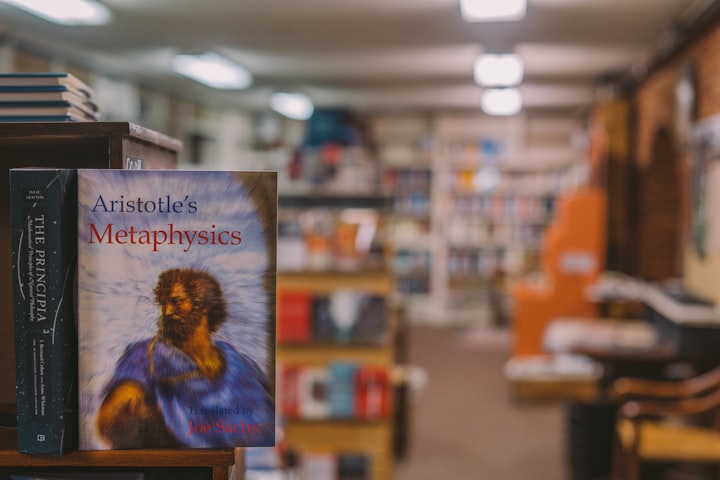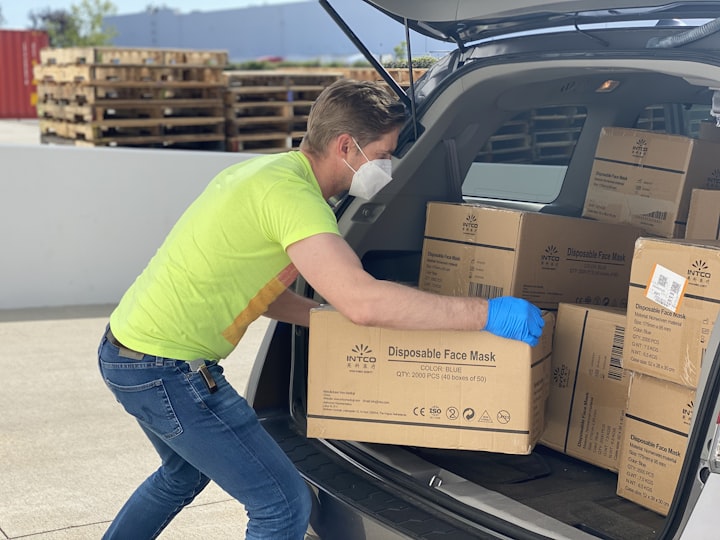Here is Aristotle's Foundation of All Wisdom and Success
Practical steps on how to use it to find yourself

Most people are stuck in their lives for one foundational reason: They do not know who they are.
And that's fine for a lot of people, they don't want to go digging for their true self, upsetting the applecart. "I have a reasonable job and a mortgage to pay, I'm happy getting on with my life, thankyouverymuch."
It's a compromise we play. Why go digging when you're doing alright? Though I suggest it's deeper than that; the real issue is most people think they know themselves already and therefore no digging is to be done.
It's odd though, isn't it, how we don't really know own strengths and weaknesses, our blind spots, our neuroses, we don't know where best to put our energy, so randomly fire it off in one direction then another, never really making progress.
Frustration becomes an odd companion in life.
Sound familiar?
How can we know who we are if we've never been challenged, if we pathologically avoid hard things? How can we know who we are if we don't do the inner work or even admit any work is to be done?
Aristotle spotted this problem over two thousand years ago. He said:
"Knowing yourself is the beginning of all wisdom."
Your relationship with you is the most important foundation for your life, from which all other things are built.
In this article we will discuss:
- Why most of us don't know ourselves
- Why knowing yourself is the key to living the life you desire
- How to know yourself and stop repeating the same mistakes
I realise this isn't for everyone, but if you want to start removing your blindspots to success and happiness, this might be for you.
Consider this a primer, a stoking of the fires of curiosity within you. The advice herein is sourced from perennial wisdom, not my own, though I will touch on how I've used these techniques to greatly improve my own life as a way of example.
With that all declared, let's get started.
Why most of us don't know ourselves
Let's look at the first issue: thinking we know who we are.
I’ve read the most common "wish come true" scenario is winning the lottery. We imagine all our problems will evaporate with a cash injection even though there are hundreds - maybe thousands - of stories of unhappy lottery winners.
It is these incorrect assumptions upon which we build our lives because it is convenient.
"Emotional sickness is avoiding reality at any cost. Emotional health is facing reality at any cost." – M Scott Peck
We think we'd be happy if we won the lottery. We think we'd be happy if we didn't have to work. Neither is true, but we don’t - or won't - acknowledge it because it’s easier to work from incorrect assumptions that free us from responsibility than it is to do the inner work to find the truth.
Ignoring uncomfortable truths won’t save us, however. Ignorance doesn’t help when it comes to creating happiness. As Mark Manson notes:
"The avoidance of suffering is a form of suffering. The avoidance of struggle is a form of struggle. Hiding from what is shameful is a form of shame."
Why you need to know who you really are
Your life needs purpose. So it goes with all of us. But how can we forge a purpose if we don't know what we want, or who we are?
Getting up, going to work, coming home and watching Netflix isn't a purpose. That is sustaining your existence, it isn’t a direction. It’s treading water.
"Life is never made unbearable by circumstances, but only by lack of meaning and purpose." – Viktor Frankl
Purpose is intrinsically attached to who you are. It is deep within, it is a calling, a unique destiny to be fulfilled by you and you alone. You cannot even begin to understand your purpose if you cannot even begin to understand yourself.
How to know who you really are
So let's get to the juicy marrow of this topic - How to know who you are. Considering we are a society obsessed with status and labels, we know very little about ourselves.
But there are tools, methods and processes we can adopt. But to even begin is to first be aware of the work required. If you are brave enough to wade into the waters of any of the following methods, pat yourself on the back for overcoming various mental hurdles in your mind to be ready for the work. The work in question is as follows:
Therapy
I thought I had it all worked out until I had a near breakdown and sought out professional help from a psychotherapist in 2014. I knew something was badly wrong, but I didn't know what. That doesn't matter. You don't have answers, all you need to know is you're ready to change.
Therapy radically transformed me through a series of sudden epiphanies and slow-burning realisations as my therapist and I unravelled my fears, my neurosis and my anger.
Therapy is a form of anti-trauma, it seeps into your bones for months and years, eradicating bitterness and removing blockers. It's scary, sure, but it's freeing. It's the fundamental basis of all true change and progress. Not everyone needs therapy (perhaps they do) but everyone can benefit from this practice.
Group therapy
This is another powerful form of therapy, but very different from the traditional one-on-one sessions in a private room.
Group therapy has its own potency, it has the power to show that your problems are everyone's problems, your shame is everyone's shame, it shows you in real, stark terms you are not crazy, you are not a failure, you are merely human.
One of the biggest breakthroughs I experienced was from an informal chat I had with another member of my therapy group after a session. He was further down the road of healing than I and offered up some advice that shined new light on an old problem. It was an amazing epiphany.
Group therapy is daunting but offers to us perspectives normally hidden from everyday life. Strangers become helpers, love becomes present and sharing becomes a genuine path to healing. Please try it.
Life Coaching
I bought both a year of Tony Robbins performance coaching (I have written about the experience in detail here) and a 12-week course of mindset coaching with another life coach.
Both experiences were hugely beneficial to clarify what I wanted, what I'm best at, who I want to be and what is important in my life.
Life coaching is a next step, not a replacement for therapy or other mental health support.
Life coaching focuses on the future and potential, it does not address nor heal the past. These are two different tools. Do not confuse them.
I had a very positive experience with life coaching but here's the kicker: it costs serious money. Group therapy is often free (donations are voluntary on the night) and standard psychotherapy can be given for free on the NHS or through other insurance-based healthcare providers.
Life coaching, on the other hand, is a straight-up financial investment. But bear in mind investment is exactly the right word. There is no better place to put your money than working on yourself. It comes back to you tenfold, in happiness, peace of mind and in progress. After all, progress equals happiness.
Books, YouTube, and Podcasts
Books are a true gift. They will help you focus on one topic for a prolonged period of time, they will make you look at life through someone else's eyes, they will transform your world page after page. Some of my greatest moments of progress come from the books I've read. These include Conversations with God by Neale Donald Walsh, The Road Less Travelled by M Scott Peck, 12 Rules for Life by Jordan Peterson and The Divine CEO by Geoff Thompson.
I'm not a reader. I am, perhaps, undiagnosed ADHD and reading for me is a Herculean struggle, however, working through a book over several months or simply picking up books and reading chapters here and there will help you. I also find Audible is a fantastic resource for consuming information when I'm driving or walking the dog.
YouTube is another great resource, and moreover, it is free. There is a staggering wealth of knowledge on this platform, from TED talks to motivational speeches, from documentaries to interviews and hundreds of hours of archived footage of lectures, discussions and so forth. The only danger with YouTube is going there to watch a speech and ending up caught in a loop of cat videos - guard your time wisely, it's the only resource you cannot stockpile or buy back.
Finally, podcasts are an absolute treasure trove of self-improvement. Podcasts such as The James Altucher Show, Impact Theory, The Joe Rogan Experience et al, have been amazing resources for my learning. Interviews from authors and thought leaders (I dislike that word, but it is rather fitting here) can give you condensed knowledge in an entertaining format.
It might sound bizarre, even frivolous, to write about psychotherapy and podcasts in the same article, but understand working on the mind is a full-time job, and absorbing information and making new neuro-connections in any way, shape or form is not to be sniffed at. Podcasts, books and YouTube are all inexpensive and effective ways to do this.
Final Thoughts
You need to journey inwards so you can recognise your blind spots, limiting thinking and mental scars so you can heal them. They won't go away by themselves.
You need to become a clear and clean vessel to be open to new creative channels and opportunities. This is how you grow.
Wisdom, the type Artistotle was talking about, isn't just about knowledge, it's about applied knowledge to find peace and happiness. It's about knowing your default, your predisposition and understanding how to stop falling into the same groove.
To end on another Aristotle quote:
"Educating the mind without educating the heart is no education at all."
Know yourself. Know your heart. Know your gifts, desires and purpose. Go digging, do the work. There's treasure to be found within you. You don't have to be unhappy.
About the Creator
Jamie Jackson
Between two skies and towards the night.






Comments
There are no comments for this story
Be the first to respond and start the conversation.